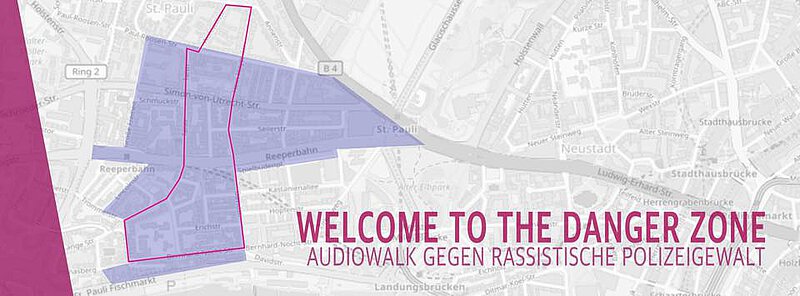Wandbild Bernhard-Nocht-Str. 44
Ein Mitglied der Gruppe Lampedusa in Hamburg erklärt, wer sie sind und warum sie sich mit den Menschen an der Balduintreppe gegen rassistische Polizeigewalt solidarisieren. Es geht darum, wie wichtig eine Arbeitserlaubnis ist statt Kriminalisierung und Ausgrenzung, wie wichtig für ihre Familien in den Herkunftsländern ihre kleinen Geldbeträge zur Unterstützung sind und um die Bedeutung von Abschiebungen für die Betroffenen. Nicht nur in den USA, auch in Deutschland muss gegen rassistische Polizeimorde gekämpft werden.
A: We started 2013 as Lampedusa Group. At that time we are fighting because of right to stay, to get work, to get access to the social system and later we discovered that to get the right to stay only is not enough. […] And the people especially in this area – of course they sell drug. They say is not good – is ok, we know that it is not good. But, what they can do? To go to steal is not good. Let them to do because they don’t have income. From what the income – this is the question, and the cops, they know that there is this problem – the cops, they cannot talk, they cannot speak – as you are human, as a police you are human. This man, he has no place to stay, he don’t have place to live, he don’t have papers to work, he don’t – ok, what do you want him to do? No one of the police asks himself this question, what do you want him to do? He have families, he have in Africa, he wants to have many things, he want to do – what do you want him to do, this man. Do you want him to go to supermarket or to the store to steal something or to do something? No. No. The two things is bad, but to sell drugs for him is better than to go to steal. This let me to tell this is the fact. Many, they will not understand this one. And you as the police ask yourself. You have to understand. If you don’t like him to do this kind of work, ok. Society in your hand, you are looking to keep the society well, to keep the city society clean, ok, give him work. Try to give him work just for one year, two years. This is also the one problem with the police, in the humanity way. But the police, they did’nt care about this one.Some people, they see you, they say just no, go out of here, I have to take you to the police, I have to deport you, I have to make this one. And he don’t know what it means, deportation, to the others. He don’t know what kind of problems this man has, in his home country… ok, he get rejected here by the court, but he don’t know the reality, what’s happened to him. Tomorrow, you want to deport him, what he can do? Maybe, he work, he can send 50 Euro, 100 Euro, monthly, to his family. This 100 Euro, maybe three babies or three girls or two students, they have income monthly, they continue their education. Until nobody supports this one.This one, if he go back, he will be very big criminal, from who, the problem, from the cops. For many start from racist control, for many start from no income, no document, no papers, no this, no this, no this, no this, no this.They think from here to here. If I start talking about the documents, I have to talk about racist controls, if I talk about racist controls, I have to talk about discrimination, if I am talking about discrimination, I have to talk about injustice. And because of that we want come out as a community, as a solidarity movement, to build ourselves, self-organize.What’s happened in the United States of America about George Floyd, the same is happening here, with Yaya Jabbi, but in different way. Yaya Jabbi is an example. And also Tonou-Mbobda is an example, the same way. Yaya Jabbi is killed by police, and the other one is killed by security of the hospital. And up to now, nothing.Racism, racist control, cops control, we can’t solve it in once. We need to stand and to say stop. Enough is enough, we have to say it together.

